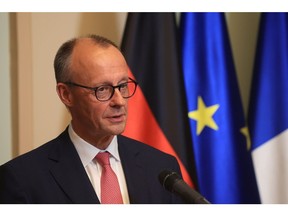
Article content
(Bloomberg) — When Friedrich Merz became Germany’s chancellor this year, he promised to revive a moribund economy, rebuild the nation’s neglected infrastructure and make the country relevant on the global stage again.
THIS CONTENT IS RESERVED FOR SUBSCRIBERS ONLY
Subscribe now to read the latest news in your city and across Canada.
- Exclusive articles from Barbara Shecter, Joe O'Connor, Gabriel Friedman, and others.
- Daily content from Financial Times, the world's leading global business publication.
- Unlimited online access to read articles from Financial Post, National Post and 15 news sites across Canada with one account.
- National Post ePaper, an electronic replica of the print edition to view on any device, share and comment on.
- Daily puzzles, including the New York Times Crossword.
SUBSCRIBE TO UNLOCK MORE ARTICLES
Subscribe now to read the latest news in your city and across Canada.
- Exclusive articles from Barbara Shecter, Joe O'Connor, Gabriel Friedman and others.
- Daily content from Financial Times, the world's leading global business publication.
- Unlimited online access to read articles from Financial Post, National Post and 15 news sites across Canada with one account.
- National Post ePaper, an electronic replica of the print edition to view on any device, share and comment on.
- Daily puzzles, including the New York Times Crossword.
REGISTER / SIGN IN TO UNLOCK MORE ARTICLES
Create an account or sign in to continue with your reading experience.
- Access articles from across Canada with one account.
- Share your thoughts and join the conversation in the comments.
- Enjoy additional articles per month.
- Get email updates from your favourite authors.
THIS ARTICLE IS FREE TO READ REGISTER TO UNLOCK.
Create an account or sign in to continue with your reading experience.
- Access articles from across Canada with one account
- Share your thoughts and join the conversation in the comments
- Enjoy additional articles per month
- Get email updates from your favourite authors
Sign In or Create an Account
or
Article content
His failure to deliver on many of these core issues has not only helped energize far-right parties like the Alternative for Germany, it’s also stoked speculation that Merz’s government may suffer the same fate as that of his predecessor, Olaf Scholz, and collapse before it completes its term.
Article content
Article content
Article content
Only 16% of Germans want to see Merz, who has just turned 70, as a candidate in the next federal election, according to a recent poll by RTL/n-tv, and his two-party coalition is paralyzed by internal conflicts and rivalries. German stocks, which surged as he took office, have been going sideways since the summer.
Article content
By signing up you consent to receive the above newsletter from Postmedia Network Inc.
Article content
“There are people in his caucus who are questioning all of the chancellor’s talk and asking themselves, where are the results?” says Sudha David-Wilp, a senior fellow at the German Marshall Fund in Berlin. “But the outlook is grim.”
Article content
Merz took office at a daunting time for Germany. An erratic and occasionally hostile US president had just returned to the White House, the war in Ukraine had shut off the energy supplies for German industry and upended the country’s assumptions about security, while relations with China were deteriorating and the long struggle to manage immigration had fueled the rise of the far right.
Article content
In his first speech as chancellor, Merz promised to fix all that.
Article content
He said he would stop mass migration, turn the chronically under-financed Bundeswehr into Europe’s strongest army and end one of the longest economic slumps in post-war German history.
Article content
Article content
“We can, through our own efforts, once again become an engine of growth that the world looks upon with admiration,” Merz told lawmakers in Berlin. Germans would feel the first effects of renewed economic growth by summer, he promised.
Article content
Six months later, voters are still waiting.
Article content
Instead, they hear daily reports of economic uncertainty and job cuts at major German companies. Last week, Merz’s advisers trimmed their German growth forecast for next year to below 1%, underscoring the scale of challenge the chancellor faces in restoring meaningful expansion to the euro area’s biggest economy. They cited long-term problems with the economy and geopolitical changes that threaten Germany’s export model.
Article content
Investors, too, have been reassessing the outlook for Germany. Stock indices focused on the domestic have shown minimal gains since Sept. 30, after surging in the first nine months of the year. While defense stocks have tumbled, led by a decline of more than 20% in Rheinmetall AG.
Article content
While economists and officials recognize that it’ll take more than six months for the government’s €500 billion ($580 billion) infrastructure package to have a visible effect, voters are already getting frustrated that trains are still late, bridges are still crumbling, and highways are still closed. Politically, the only result of the plan so far has been that conservatives blame Merz for breaking a promise to contain borrowing and are worried about the country’s fiscal situation.

.jpg) 2 hours ago
2
2 hours ago
2
 English (US)
English (US)